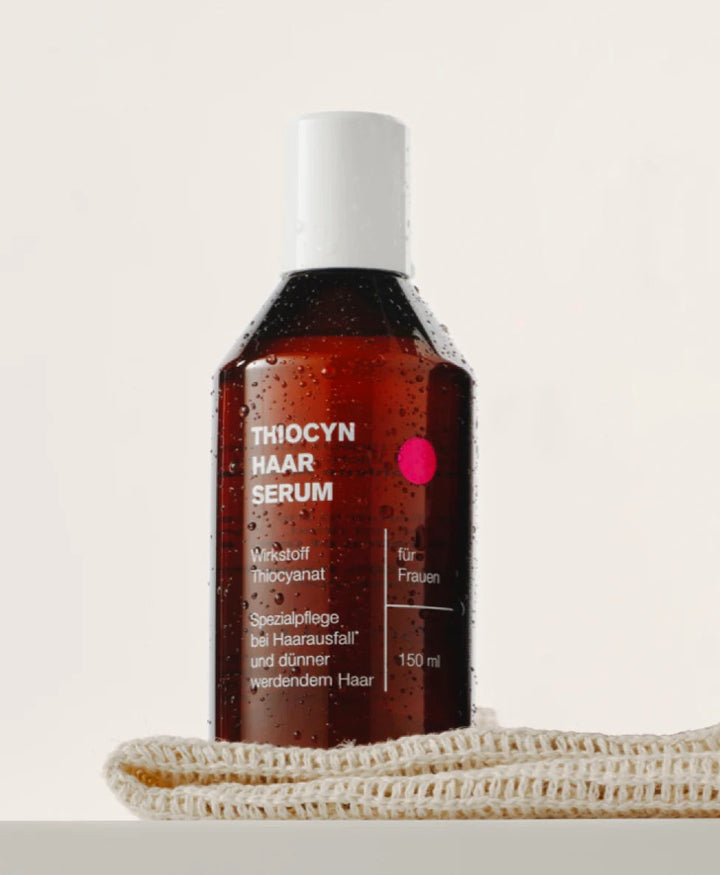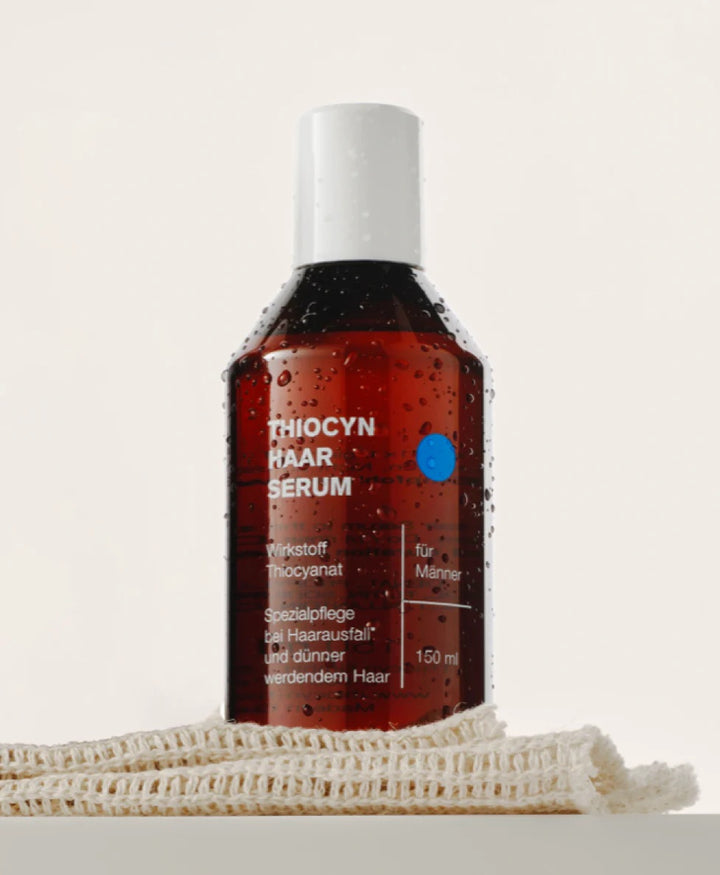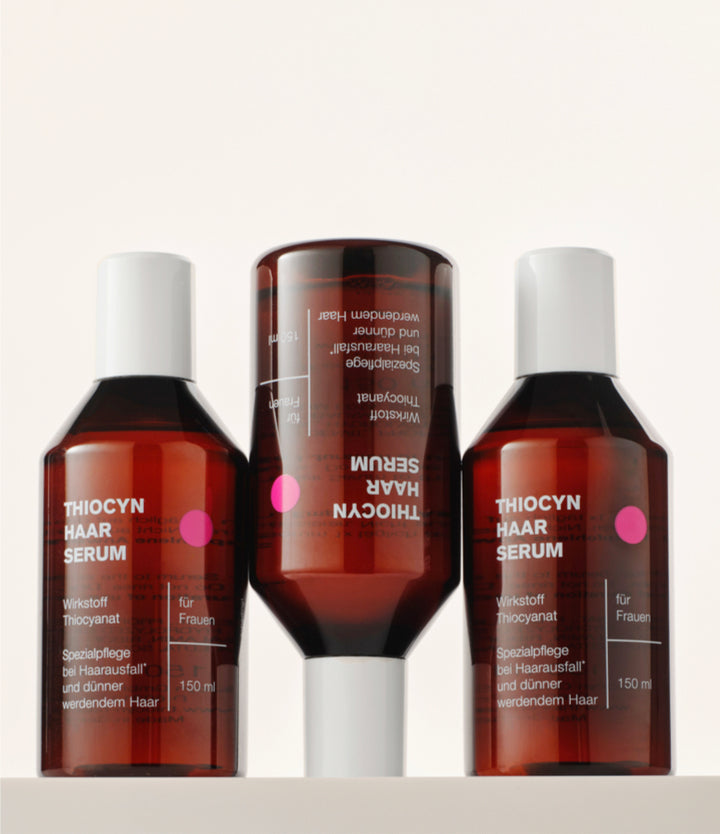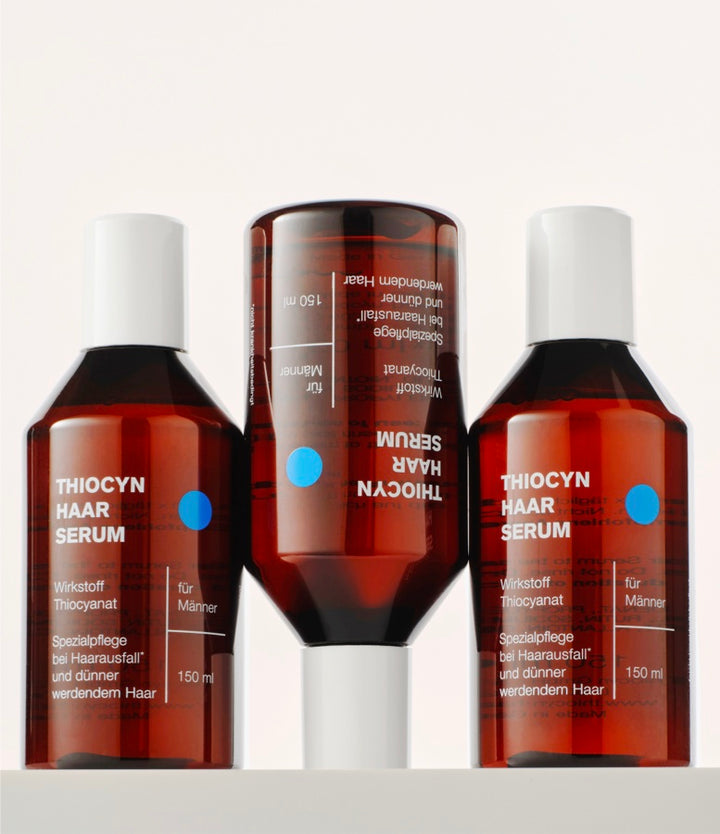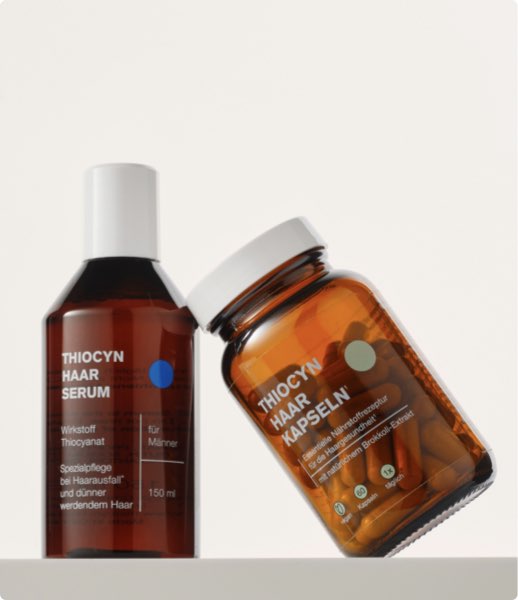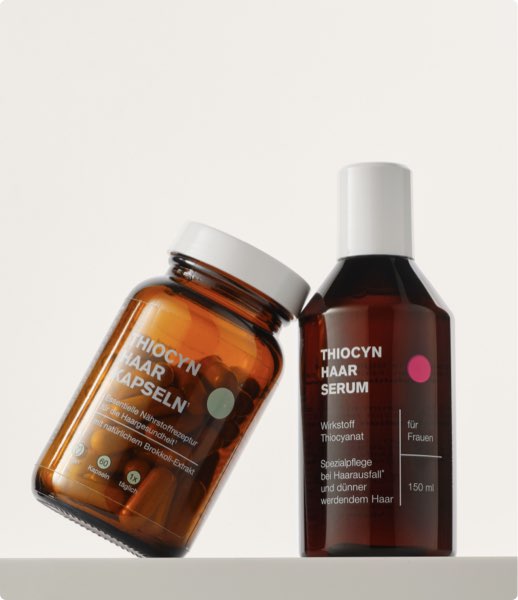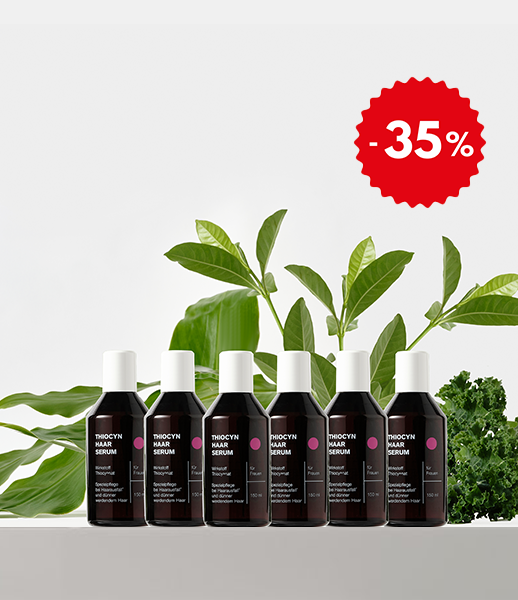| 04. July 2023
Dry scalp, flaky scalp

- Dry scalp lacks moisture.
- If your scalp is dry and flaky, the skin’s protective barrier is weakened.
- Inflammation of the epidermis and hair follicles is likely.
- Itching is aggravated by unsuitable care products.
You can feel a dry scalp: It feels tight and itchy. And you can see it: A dry scalp shows fine cracks. Dandruff indicates a weakened skin barrier. Invading allergens provoke itching and inflammation. How can the scalp be regenerated? With a special care shampoo—and, surprisingly, with a hair growth product, Thiocyn Hair Serum.
Causes of dry scalp
Dry scalp occurs when the balance of skin oils and moisture, as well as the renewal process of skin cells, is out of balance. Dry and cracked scalp promotes the penetration of irritants. Skin irritations such as itching Redness and dry dandruff also occur. Causes of dry scalp include direct sunlight, warm air (heating, hairdryer), stress, medication, atopic dermatitis, aging processes, and, last but not least, excessive hair washing.
Use of shampoo and water
Overly harsh shampoos are generally considered one of the primary causes of dry scalp. The surfactants in shampoos remove dandruff, environmental pollution, and inorganic salts, and most importantly, they also wash away sebum (oil). Oil makes skin and hair supple and water-repellent. If oil is regularly removed from the scalp, the scalp loses moisture.
In addition to the use of unsuitable shampoos, especially anti-dandruff shampoos for oily dandruff, contact with water, specifically showering for too long, is also problematic. Our skin has a slightly acidic pH of 5.5, whereas water has a neutral pH of 7. Due to the power of diffusion, the molecules tend to balance the pH. This causes the skin to become more alkaline and drier simply through contact with water.
When skin moisture decreases, the scalp becomes drier and more flaky, and hair tends to become brittle. Often, the hair growth phase is also interrupted by the hair follicles when the inflammation reaches the hair root. In this critical situation, the hair follicles shed the hair, resulting in hair loss .
Dry scalp: care tips
Normally, our scalp doesn't need any aids for regeneration. However, if the skin barrier is out of balance, the use of certain care products is a logical step.
Moisturizing creams or lotions that protect the scalp from moisture loss should be avoided in the treatment of dry scalp because they have the "side effect" of making hair greasy. Home remedies, such as an olive oil treatment, have a soothing effect in the short term, but do not address the root cause of dry scalp. Even the best home remedies only delay the solution to the problem.
The question is: How can a dry scalp be restored to balance? Here are two tips.
Care shampoo
Although shampoo removes moisture from the scalp and hair, there are fortunately mild and moisturizing care shampoos, such as noreiz Skin Soothing Care Shampoo . Finely balanced care ingredients promote scalp regeneration: Allantoin accelerates cell formation and cell regeneration and soothes the skin, while urea moisturizes the skin. Especially in cases of atopic dermatitis, noreiz Skin Soothing Care Shampoo has been proven to noticeably reduce dandruff and itching.
Last but not least, the noreiz Skin Soothing Care Shampoo ideally prepares the dry scalp for the use of the Thiocyn Hair Serum.
Thiocyn Hair Serum
A special care product that's actually used for hair loss*, thinning, and sparse hair, to regenerate dry scalp? Yes, that makes sense. Because to normalize the hair cycle, stop hair loss*, and stimulate hair growth, the scalp must first be soothed and regenerated. This is what the patented thiocyanate formula achieves.
Thiocyanate is not an invention of modern chemistry, but a natural molecule that has accompanied the emergence of life from the very beginning and is therefore of great importance for the human organism – both for the cellular metabolism of the hair at the hair root and for the cellular metabolism of the scalp.
Perception of dry scalp
The scalp is arguably the most sensitive part of the human skin. It has more nerve cells than other skin areas. Thermoreceptors react to heat or cold. Pain receptors are activated by mechanical, thermal, or chemical impulses. There are even special receptors for itching. Mechanoreceptors detect the intensity of pressure on the skin or skin stretching. The hair on the scalp also sends signals to the brain: If the hair is touched or moved (by a draft), the receptors in the hair follicles report this. Last but not least, dry dandruff that "trickles" from the scalp is a sure sign of a dry scalp.
What are dry dandruff?
Depending on skin type, every person's scalp flakes to a greater or lesser extent in the form of dead skin cells. Clusters of 500 or more skin cells (corneocytes) become visible on hair or clothing as dandruff. A dry scalp—especially as a result of using certain shampoos and skincare products—leads to the formation of larger flakes. Neurodermatitis or hormonal imbalances can also be causes of dandruff.

READ BY 23,000 PEOPLE
Join 23,000 others and find out how to improve your hair health with great offers and discounts as well as helpful advice
